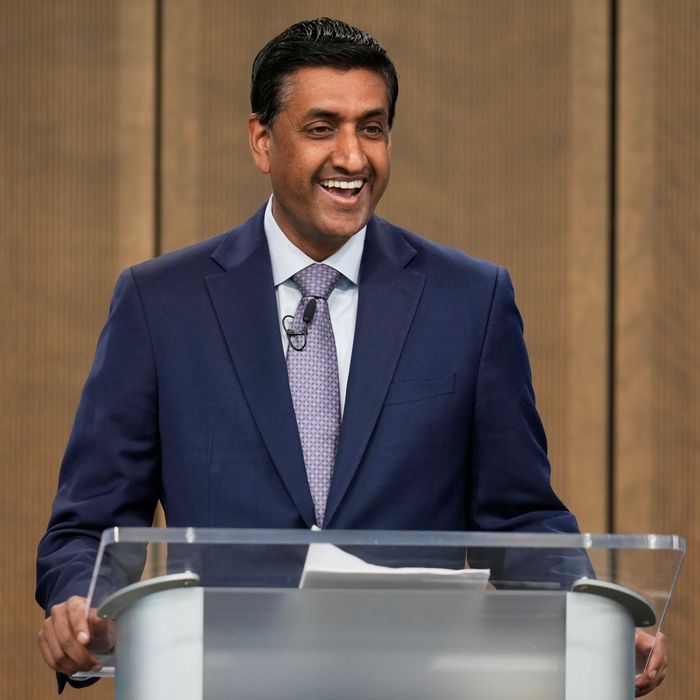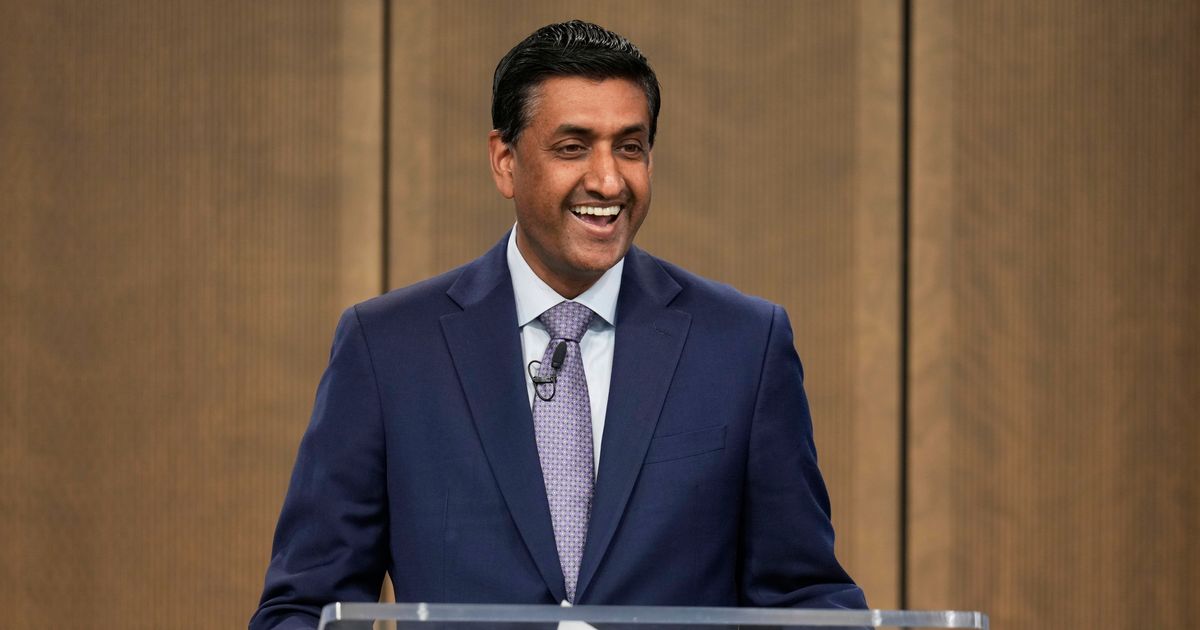
Photo: Sue Ogrocki/AP Photo
It was becoming apparent that Yale wasn’t exactly excited about the arrival of Ro Khanna, the rising-star congressman from Silicon Valley who is, like Bill and Hillary Clinton and the current vice-president of the United States, an alumnus of its famed law school. “I hate what the university is doing here, having people go through a line and preregister and not having the community coming out,” Khanna told me as we shared some New Haven–style clam pizza. “They were basically saying we shouldn’t have press here. I said that’s the exact opposite of the message we’re preaching, that we’re standing up for speech and a press. They were concerned about potential attacks on J.D. Vance — but that’s part of standing up for speech.”
Khanna had traveled to Yale to accomplish several tasks: rebuke J.D. Vance, stand up for academic freedom, and, though he’s loath to admit it, burnish his profile ahead of a possible presidential run in 2028. The late lunch break, at the century-old Frank Pepe Pizzeria, had its own presidential theme: Khanna dined under a photograph of Bill Clinton, in the flower of his own campaign era, gorging on a Pepe pizza. Khanna had already spent the day meeting with Bruce Ackerman, the prominent Yale constitutional scholar; talking to law students; and delivering his keynote to a select number of law-school attendees. University staffers manned ID checkpoints ahead of time and restricted access as much as they could for a sitting congressman’s very public speech. Security seemed befuddled, at first, that I was following Khanna inside as a member of the media.
Behind the lectern, Khanna certainly didn’t hold back. He called Vance a “stain” on the degree of every Yale graduate and likened him to Stalin, intoning that “strongmen do not fear recessions or even failed wars as much as they fear the university.” It was the day, April 15, I first became aware of Kilmar Abrego Garcia, the Maryland man the Trump administration had wrongfully — and gleefully — deported to a hellish El Salvador prison. Vance was the face of the new MAGA cruelty, mocking the idea of due process and smearing Garcia as a violent gang member. Garcia was very much on Khanna’s mind. Vance, Khanna declared, “answered not with reason but with feigned rage — accusing us of sympathy for a gang member. Nine Supreme Court justices firmly rejected his claim that Abrego had no legal right to be here.”
Khanna, who co-chaired the 2020 Bernie Sanders campaign and identifies as a “progressive capitalist,” is something of a throwback: a politician who proudly wears his intellectualism on his sleeve. Once, presidential candidates like Robert F. Kennedy (senior) could readily quote Aeschylus. Khanna is happy to cite John Rawls and doesn’t shy from launching into a full-throated defense of the elite American university. The question for him — and for every Democrat, of course, who is flirting with a future presidential bid — is how far he can go.
Typically, top Democratic contenders have been governors and senators, but Khanna has kept an aggressive travel schedule (he has journeyed to Republican House districts to host town halls when the local representative has dodged furious constituents) and the old rules of politics don’t seem to apply much during the Trump restoration. Alexandria Ocasio-Cortez is a member of the House who may vault into the top tier of presidential contenders, and political novices like Stephen A. Smith and Mark Cuban are getting a serious hearing. The next Democratic primary will be the most wide open in at least 20 years.
Khanna, 48, cuts a unique profile as a Silicon Valley Democrat who spends much of his time fretting voters in places like Bucks County, Pennsylvania, where he grew up. The son of Indian immigrants, he began his career as an intellectual-property attorney before being appointed, in 2009, deputy assistant secretary in President Obama’s Department of Commerce. Before Obama won, Khanna never thought he would have a career in politics himself. He said one politico told him, “‘Being Indian, of course you can’t get elected, but, you know, you’re good at policy; you should go work on the Hill or do something with a think tank.’ It was a different time,” Khanna added. “You know, Obama changed the trajectory of what was conceivable.”
Life in the Obama administration convinced him he could, in fact, have a future in elected office. “You would’ve had no shot in the late 1990s as an Indian Hindu in politics. Now we have so many of them,” Khanna said, laughing.
After coming close to unseating Mike Honda, a longtime California congressman, in 2014, Khanna challenged him again in 2016 and won. Khanna is well wired with tech entrepreneurs — he’s fluent in the language of the new Tech Right, if he rejects their politics — and offers a sort of mirror image of Vance, who grew up in Appalachia and found his post–Hillbilly Elegy fortune through his relationship with Peter Thiel. Vance and Khanna have sparred on X with Khanna challenging the VP over his support for the DOGE worker who was found to have posted, “Normalize Indian hate.” Vance accused Khanna of engaging in “emotional blackmail,” adding, finally, “You disgust me.” Khanna plainly views Vance as the future of the GOP, even with the talk of Trump illegally running for a third term.
Khanna is from the talk-to-everyone school. As they once said about Ed Koch, he is unavoidable for comment. “I go on conservative podcasts, I go on Fox, I engage with a lot of different folks,” Khanna said, “and I just think the Democratic Party has to get back to a robust defense of free speech.”
He is reserved about a possible White House run but only to a point. “Everyone tries to ask the question in a hundred different ways,” he told me, his Bucks County accent still coming through. He said he is currently most concerned with winning House seats for the Democrats and creating pushback against Trump-Vance in a noisy media environment. “There was an element of theater in coming to Yale and calling out Vance as opposed to just giving the speech on the House floor,” he said. “I don’t apologize for that. Democrats have to get better at figuring out how we break through.”
At Yale, Khanna ushered a handful of reporters to the New Haven Towers, where he once lived as a law student, though he confessed his most formative years came as an undergraduate at the University of Chicago. If he lacks the obvious charisma of an AOC or even a Pete Buttigieg — his style is methodical, lacking in flash — he may hunt out a 2028 lane through his doggedness on the stump and his vision of a muscular, anti-MAGA “economic patriotism” somewhat wonkier than the Bernie variety.
After the speechifying, a seminar with eager (and GOP-skeptical) law students, and the Pepe pizza, Khanna had an evening with the Yale Political Union. Several weeks earlier, coincidentally, I had also spoken there, and I told Khanna it was a great but unusual experience: Speakers debate and a winner is voted on by the undergraduates in the union, but the student speeches are what carry the day. The debate is Oxford style, with a resolution agreed upon ahead of time, and the speaker doesn’t go back and forth with opponents so much as deliver opening and closing remarks and witness others hash it out. When students like what they hear, they tap their seats. Instead of boos, they offer hisses. It’s all a bit campy and self-consciously farcical.
Khanna, earnest as ever, spoke in defense of the resolution that “pro-growth progressivism is America’s next chapter” and his hope to add one new factory and one new school to 100 American towns. He praised Joe Biden’s green industrial policy, to hisses from the group’s conservatives, and argued for raising taxes on billionaires. The students, when they spoke, were earnest too. Or most of them anyway — one speaker, a British expat, called for America to embrace its “frontier spirit” anew and, for reasons unclear, ban rap music in public schools. In the end, Khanna carried the day: More students believed pro-growth progressivism was indeed America’s next chapter.
In the meantime, did Khanna have any more Vance-themed engagements in mind? “How many ways can I troll him?” he asked, laughing to himself.
